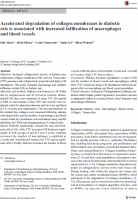Accelerated Degradation of Collagen Membranes in Diabetic Rats is Associated with Increased Infiltration of Macrophages and Blood Vessels
Objectives Increased collagenolytic activity in diabetes may
compromise collagen membrane (CM) survival. Tetracycline
(TTC) possesses anti-collagenolytic properties and delaysCM
degradation. This study evaluated macrophage and capillary
infiltration within CMs in diabetic rats.
Materials and methods Diabetes was induced in 20 Wistar
rats by streptozotocin and 20 served as controls. Biotinlabeled
CM discs were immersed in either TTC (50 mg/ml)
or PBS. In each animal, 2 discs (TTC and control) were implanted
under the parietal periosteum and rats were sacrificed
at 2 or 4 weeks post-implantation. The area and thickness of
the residual disc collagen were measured following staining
with streptavidin, and the number of macrophages and blood
vessels within the membranes was determined using specific
antibodies (to CD68 and transglutaminase II, respectively).
Results Diabetes significantly reduced the area and thickness
of the CMs, while TTC increased CMthickness significantly
in both groups of rats at 2 and 4 weeks. Diabetes
increased the number of macrophages (∼eightfold at
2 weeks and ∼fourfold at 4 weeks), but TTC had no significant
effect. Finally, diabetes increased the number of blood
vessels within the discs (∼threefold at 2 weeks and ∼twofold
at 4 weeks), while TTC had no effect.
Conclusions Diabetes increases degradation of native CMs
and the number of blood vessels and macrophages within
them. TTC immersion delays CM degradation without an apparent
effect on macrophage and blood vessel penetration.
Clinical relevance Enhanced CMdegradation in diabetic conditions
which impair guided regenerative procedure outcome
is apparently related to increased blood vessel formation and
macrophage infiltration.

